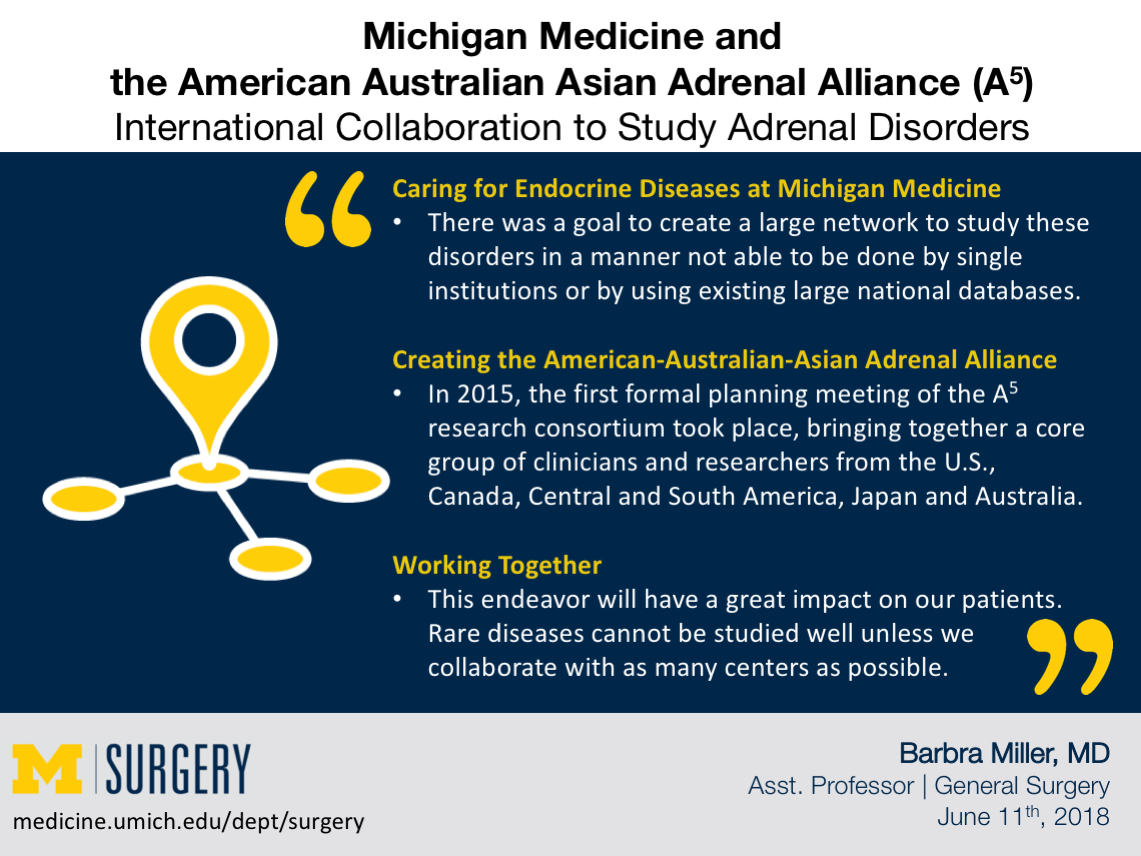Michigan Medicine and the American Australian Asian Adrenal Alliance: International Collaboration to Study Adrenal Disorders
Media contact: Nicole Fawcett, 734-764-2220 | Patients may contact Cancer AnswerLine 800-865-1125
The American Australian Asian Adrenal Alliance (A5) aims to facilitate and leverage international collaboration to advance the study of adrenal disorders.

Studying Endocrine Disorders at Michigan Medicine
There is a long and rich history of important contributions to the understanding of endocrine disorders and to advancing the care of endocrine patients by faculty and staff across many Departments at Michigan Medicine (Surgery, MEND, Radiology, Nuclear Medicine, Oncology, Pathology). As an internationally renowned center for patients with adrenal cancer, a rare and aggressive disease, the multidisciplinary endocrine oncology group at U-M is a leader in the clinical care of these patients as well as the advancement of basic science, translational and clinical research. Additionally, U-M is a leader in benign adrenal disorders which include primary aldosteronism (discovered by U-M endocrinologist Jerome Conn), hypercortisolism, and pheochromocytoma/paraganglioma (excess production of adrenaline). For many years, there has been a desire to bring together a large network of institutions to work collaboratively to study adrenal disorders in a manner unable to be accomplished by single institutions or by using existing large national databases.
Creating the American Australian Asian Adrenal Alliance
The European Network for the Study of Adrenal Tumors (ENS@T) was founded in 2002 by combining three existing national adrenal networks (COMETE in France, GANIMED in Germany, and NISGAT in Italy) with additional teams from the United Kingdom to study adrenal tumors. While significant advances in the care of patients with adrenal disorders have been made by this group, there are limitations to the scope of what can be studied. For example, genetic variations between races which may impact management are not easily investigated in Europe alone.
In 2005, U-M hosted the first of two consecutive International Adrenal Cancer conferences. These biennial meetings, held worldwide, eventually returned to Ann Arbor in 2015. At the conclusion of that meeting, the first formal planning meeting of the international multi-specialty American Australian Asian Adrenal Alliance (A5) took place, bringing together a core founding group of clinicians and researchers from across the United States, Canada, Central and South America, Japan and Australia.
In the Fall of 2017, legal agreements between the founding institutions were finalized. While still in its infancy, over 25 institutions with significant adrenal programs in 7 countries on 4 continents have already joined the Alliance. Institutions rather than individuals join the Alliance. This eases requirements at an individual level and encourages multidisciplinary involvement within and between institutions. Endocrinologists, surgeons, radiologists, radiation oncologists, medical oncologists, pathologists, geneticists and basic science researchers are encouraged to become involved. Groups within the Alliance have initially been organized by disease process and hormone type resulting in five working groups (adrenal cancer, cortisol, aldosterone, pheochromocytoma/paraganglioma, benign non-functional adrenal tumors). Formal meetings of the Alliance to discuss new and ongoing projects are held multiple times during the year.
Working Together
Adrenal disorders can lead to debilitating and life-threatening problems including hypertension, heart disease, diabetes, stroke, obesity, and cancer, all of which are major public health issues. Primary aldosteronism can contribute to hypertension in nearly 10% of patients seen in specialty hypertension clinics. A5 aims to facilitate and leverage international collaboration and resources to advance the study of adrenal disorders through sharing of bio-samples and highly specific clinical data critical for understanding the disease processes being studied which are unavailable in existing national databases. The Alliance will hopefully allow for the better understanding of both common and rare adrenal disorders, and through translational research eventually lead to the development of better treatments for patients.
Any institution can join A5. Rare diseases cannot be studied well unless collaboration occurs between as many centers as possible. With international collaboration, identification of genetic and cultural differences affecting presentation, diagnosis, treatment and outcomes will be possible. This is a unique opportunity to be involved in what we predict will be a far-reaching and long-lasting endeavor, ultimately leading to significant advances in patient care.
